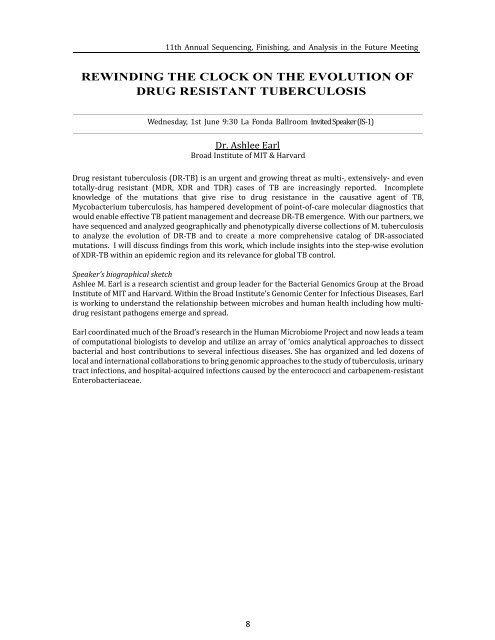Sequencing
SFAF2016%20Meeting%20Guide%20Final%203
SFAF2016%20Meeting%20Guide%20Final%203
You also want an ePaper? Increase the reach of your titles
YUMPU automatically turns print PDFs into web optimized ePapers that Google loves.
11th Annual <strong>Sequencing</strong>, Finishing, and Analysis in the Future Meeting<br />
REWINDING THE CLOCK ON THE EVOLUTION OF<br />
DRUG RESISTANT TUBERCULOSIS<br />
Wednesday, 1st June 9:30 La Fonda Ballroom Invited Speaker (IS‐1)<br />
Dr. Ashlee Earl<br />
Broad Institute of MIT & Harvard<br />
Drug resistant tuberculosis (DR‐TB) is an urgent and growing threat as multi‐, extensively‐ and even<br />
totally‐drug resistant (MDR, XDR and TDR) cases of TB are increasingly reported. Incomplete<br />
knowledge of the mutations that give rise to drug resistance in the causative agent of TB,<br />
Mycobacterium tuberculosis, has hampered development of point‐of‐care molecular diagnostics that<br />
would enable effective TB patient management and decrease DR‐TB emergence. With our partners, we<br />
have sequenced and analyzed geographically and phenotypically diverse collections of M. tuberculosis<br />
to analyze the evolution of DR‐TB and to create a more comprehensive catalog of DR‐associated<br />
mutations. I will discuss findings from this work, which include insights into the step‐wise evolution<br />
of XDR‐TB within an epidemic region and its relevance for global TB control.<br />
Speaker’s biographical sketch<br />
Ashlee M. Earl is a research scientist and group leader for the Bacterial Genomics Group at the Broad<br />
Institute of MIT and Harvard. Within the Broad Institute’s Genomic Center for Infectious Diseases, Earl<br />
is working to understand the relationship between microbes and human health including how multidrug<br />
resistant pathogens emerge and spread.<br />
Earl coordinated much of the Broad’s research in the Human Microbiome Project and now leads a team<br />
of computational biologists to develop and utilize an array of ‘omics analytical approaches to dissect<br />
bacterial and host contributions to several infectious diseases. She has organized and led dozens of<br />
local and international collaborations to bring genomic approaches to the study of tuberculosis, urinary<br />
tract infections, and hospital‐acquired infections caused by the enterococci and carbapenem‐resistant<br />
Enterobacteriaceae.<br />
8


